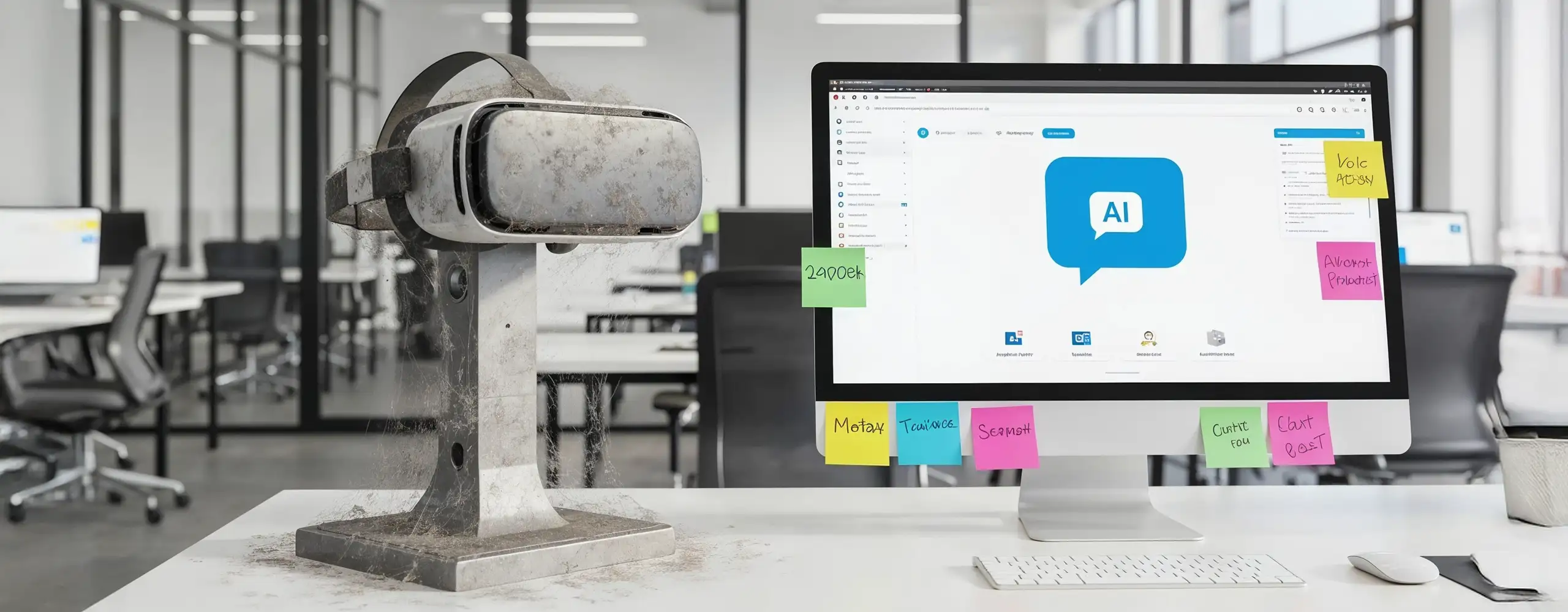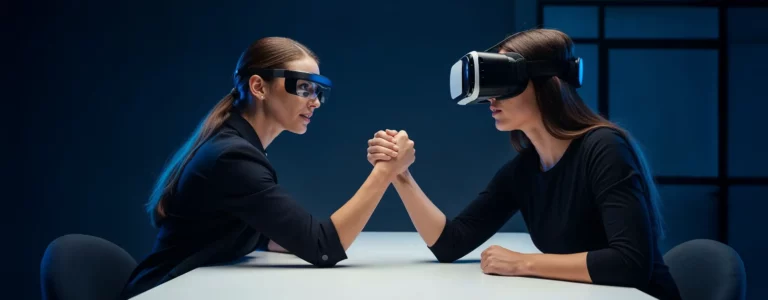The 2023 Metaverse Failure: Why AI Overtook Extended Reality
“The hype around the metaverse has been superseded by AI”
observes Amy Peck, drawing from her 11 years of experience in immersive technologies. This brutal transition between two supposed technological revolutions raises a fundamental question: why did generative artificial intelligence so quickly eclipse extended reality in the attention of the general public and businesses?
Amy’s answer is definitive and reveals a fundamental difference in how these technologies are approached. Where the metaverse promised a radical transformation of our digital interactions, ChatGPT and generative AI delivered immediate and measurable utility.
This distinction between promise and delivery largely explains why the metaverse failed against artificial intelligence in the race for mass adoption. The commercial metaverse required a major behavioral change from users, while conversational AI naturally slipped into our existing habits.
Mass ChatGPT Adoption: Daily AI Utility with No Entry Barriers
“AI immediately, with almost no barrier to entry, brought daily utility to everyone”
explains Amy Peck. This observation strikes at the heart of what differentiates successful technology adoption from a simple fad.
The universal accessibility of AI is striking in its simplicity. As Amy highlights:
“Everyone can log on and find daily utility, whether it’s simply finding a better recipe or a better travel route.”
This immediate democratization of artificial intelligence contrasts radically with the metaverse experience, which required:
• Acquiring specialized equipment (VR headsets)
• Learning new interfaces
• Adapting to immersive virtual environments
• Creating avatars and digital identities
Where the metaverse required personal and financial investments, ChatGPT and AI tools were satisfied with a simple question typed into a web browser. This zero friction largely explains the phenomenal adoption speed of generative AI.
Extended Reality Adoption Barriers: Why XR Technologies Remain Complex
“We haven’t been able to deliver that seamlessly with XR”
Amy Peck frankly admits when talking about daily utility. This honesty from an expert who has dedicated her career to immersive technologies reveals the persistent challenges of extended reality.
XR adoption barriers remain numerous and complex:
Still inadequate devices
Amy points to a revealing paradox:
“We call them wearables, ironically, but they’re not actually wearable.”
Current VR headsets, despite their progress, remain bulky and require a dedicated space of at least six square meters for safe use.
Frustrating user experience
Even mobile augmented reality, accessible on our smartphones, suffers from significant limitations.
“Mobile AR is just a short, sharp shock. For AR navigation: you hold your phone up until the arrow appears”
observes Amy, but this gesture doesn’t provide an optimal user experience over time.
Integration complexity
Unlike AI that integrates into our existing workflows, XR technologies often require a complete process overhaul. Companies must train their teams, adapt their spaces, invest in new equipment, and maintain complex technical environments.
AI vs Virtual Reality: Comparing Technology Adoption Models
Amy Peck’s analysis reveals two radically different innovation philosophies. Generative artificial intelligence followed the smartphone adoption model: an incremental improvement of existing uses with an almost zero learning curve.
The metaverse and XR technologies attempted to reproduce the total disruption model, comparable to the arrival of the Internet in the 90s. But users in 2023 have immediacy expectations forged by two decades of digital innovations.
Contrasting adoption patterns
Generative AI benefited from what Amy describes as “daily utility.” Each interaction brings measurable value: a better-written email, more precise search, optimized code. The accumulation of these micro-benefits creates positive dependency and natural adoption.
XR technologies, on the other hand, promise macro transformations that are slow to materialize in daily use. They excel in specialized contexts – professional training, data visualization, remote collaboration – but struggle to find their place in the average user’s routine.
AI-VR Convergence: How AI Accelerates Immersive Technologies
Despite this assessment, Amy Peck doesn’t consider AI a competitor to immersive technologies. On the contrary, she sees it as a potential catalyst:
“AI enables creating these digital universes, these digital assets so quickly. And even generating and correcting code bases.”
This technological convergence could solve several persistent XR challenges:
Simplified content creation
Generative AI democratizes the creation of virtual environments and 3D assets, traditionally reserved for specialized studios. This democratization of creation tools could accelerate the emergence of richer and more diverse XR content.
Natural interfaces
AI can also transform XR interfaces by making them more intuitive. Natural voice interactions, automatically recognized gestures, environments that adapt to user intentions – all improvements that could reduce adoption friction.
Contextual personalization
AI excels at context analysis and personalization. Applied to XR, it could offer tailored experiences that increase the relevance and utility of each immersive interaction.
Toward Mature Technological Coexistence
The main lesson from this metaverse vs ChatGPT confrontation doesn’t lie in one “winning” over the other, but in understanding modern technology adoption mechanisms.
Amy Peck reminds us that “we’re still in the second inning” of this technological revolution. Generative AI conquered attention through its immediate utility, but immersive technologies retain enormous potential to transform how we work, learn, and collaborate.
The real question isn’t which technology will dominate between metaverse and AI, but how they’ll converge to create experiences that are both useful and transformative. The future of immersive technologies probably belongs to those who can combine the accessibility of conversational AI with the immersive potential of extended reality XR.
Do these insights resonate with your business challenges? Contact us to dive deeper into these questions and their application in your industry.
Amy Peck is founder of EndeavorXR, advisor to Fortune 500 companies, and ranks among the top 100 women of the future. Her expertise in extended reality enables her to guide organizations in the strategic adoption of immersive technologies.
David Smadja guides leaders through digital and marketing transformation. Former digital manager at Nestlé, he helps companies navigate technological disruptions and adapt their strategies to new consumer behaviors.
Article from podcast #3:
Rethinking Reality : How XR is quietly reshaping Business with Amy Peck






